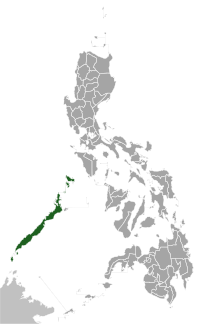Palawan Hornbill
| Palawan Hornbill | |
|---|---|
 | |
| Conservation status | |
| Scientific classification | |
| Kingdom: | Animalia |
| Phylum: | Chordata |
| Class: | Aves |
| Order: | Coraciiformes |
| Family: | Bucerotidae |
| Genus: | Anthracoceros |
| Species: | A. marchei |
| Binomial name | |
| Anthracoceros marchei Oustalet, 1885 | |
 | |
| Palawan Hornbill range | |
The Palawan Hornbill (Anthracoceros marchei), known locally as Talusi in Filipino language, is a smallish (approximately 70 centimetres (28 in) long) forest-dwelling bird. Its plumage is predominantly black with a white tail, a dark green gloss on its upper parts and a large creamy-white beak with a casque typical of the hornbill family. The bird emits loud calls which can be transcribed as kaaww and kreik-kreik.
Nine species of hornbill are found in the Philippines and the Palawan Hornbill is endemic to Palawan island, but has also been recorded on nearby islands of Balabac, Busuanga, Calauit, Culion and Coron. Most visiting birdwatchers travel to St Paul's National Park, Palawan to see this bird, but it is now uncommon. It acts as a bio-indicator due to its sensitivity to environmental changes. It is officially classified as "vulnerable" and its numbers have reduced by at least 20% in the last 10 years, due to habitat destruction and hunting for food and the live bird trade.
It is usually seen in pairs or small noisy family parties, and has a communal roosting site. It is most usually observed in fruiting trees at the forest edge, but also feeds on insects and small reptiles.

No comments:
Post a Comment